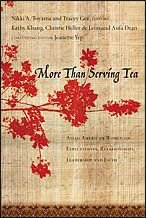Tuesday, June 5, 2007
Boundaries, enmeshment and justice
A friend recently had 20 young people stay at his house. He had about 10 hours notice before they descended on his 2 bedroom home. A group of young people from the garbage village needed a place to stay. He received a call at 11:45pm that night. What could he do?
We were talking about this at lunch. His repeated attempts at trying to draw healthy boundaries with the leader did little good.
I'm beginning to wonder if boundaries are the luxury of the middle class. Is there such thing as boundaries when you're doing justice work?
I've wondered about boundaries, Asian American families, and Christian discipleship. What therapists call "enmeshment" is a common occurrance in Asian American families. Is it an issue that we need to fight against in the Asian community. Or is family therapy culturally bound.
What some might called "enmeshed" has great characteristics. There's a wonderful sense of involving everyone, and a corporate identity that is a healthy antidote to a narcissitic individualized model. But it has its problems too.
From my limited vantage point, it comes across as parents who are very upset at a young person's decision. A lot of emotional pressure lands on the young person to comply to their wishes. I've heard extreme cases of threatening suicide unless a young person changes their plans. More common examples are sleepless nights, extreme anxiety, etc. Are the young people just clueless and self-absorbed? Or is the older generation enmeshed? Both?
Is this just how things get done in Asian American households? What's the Christian response?
What's cultural? What's Christian? What's do we embrace and what do we work against?
We were talking about this at lunch. His repeated attempts at trying to draw healthy boundaries with the leader did little good.
I'm beginning to wonder if boundaries are the luxury of the middle class. Is there such thing as boundaries when you're doing justice work?
I've wondered about boundaries, Asian American families, and Christian discipleship. What therapists call "enmeshment" is a common occurrance in Asian American families. Is it an issue that we need to fight against in the Asian community. Or is family therapy culturally bound.
What some might called "enmeshed" has great characteristics. There's a wonderful sense of involving everyone, and a corporate identity that is a healthy antidote to a narcissitic individualized model. But it has its problems too.
From my limited vantage point, it comes across as parents who are very upset at a young person's decision. A lot of emotional pressure lands on the young person to comply to their wishes. I've heard extreme cases of threatening suicide unless a young person changes their plans. More common examples are sleepless nights, extreme anxiety, etc. Are the young people just clueless and self-absorbed? Or is the older generation enmeshed? Both?
Is this just how things get done in Asian American households? What's the Christian response?
What's cultural? What's Christian? What's do we embrace and what do we work against?
Subscribe to:
Post Comments (Atom)

5 comments:
I would venture to guess that most of Jesus' acquaintances would qualify for family therapy under current definitions of what enmeshment is. After all James & John's mother got them to ask Jesus about their place in the KofH, Peter's mother in law was living with him, and even Jesus' family all showed up to tell him what he was doing was kind of crazy and embarrassing to the family.
The radical individualism and autonomy of the modern West is a historical and cultual anamoly that would be unrecognizeable in most places and times in history. Jesus never seeks to entirely undo the cultural structure of families in his day although he does give very clear guidance on how those structures and relationships ought to function in light of the gospel.
To replace "Asian" family models with Western ones is not the gospel. Besides from a strictly social and economic vantage point, it has been hugely successful in catapulting AA in to the ranks of the upper middle educated ranks in ways that benefit the entire family rather than the lone individual.
Hi, fellow Asian American women! I just wanted to encourage you to keep posting on this blog. The blogosphere has a lot of material on already oversaturated topics, but Asian American womanhood and spirituality is certainly not one of them.
Definitely not a "luxury of the middle class." It's a luxury of having enough exposure to western culture! My parents came to Canada when they were in their 20s, yet I had less "space"/"privacy" in my upper middle class upbringing than my white peers of the same class.
(p.s. I'm a recently-published writer. Please check out my writing blog at http://writergal8.blogspot.com )
I don't have a lot of developed thoughts on this, but I really appreciated the post!
I read the book Boundaries this summer and have definitely thought of how boundary issues probably work differently in different cultures. And actually, just as you sorta mentioned, another thing reading the book made me think about a lot was how boundaries should function in specific ministry settings, for example, urban ministry.
Cloud and Townsend are great on some stuff, but ya know, it could be real nice to hear some other voices on the way boundaries work for all different kinds of people!
I think boundaries are influenced by cultural expectations. I'm a white female who married an asian american male. The biggest challenge to our relationship has been what I see as boundary issues. I was seen as cold by in-laws because I had no clue about this sense of involving everyone, or "enmeshment." On the flip side, I viewed actions by my in-laws as pushy and invasive. Our relationship suffered until we began to understand these different boundary expectaions and make mutual compromises.
Post a Comment